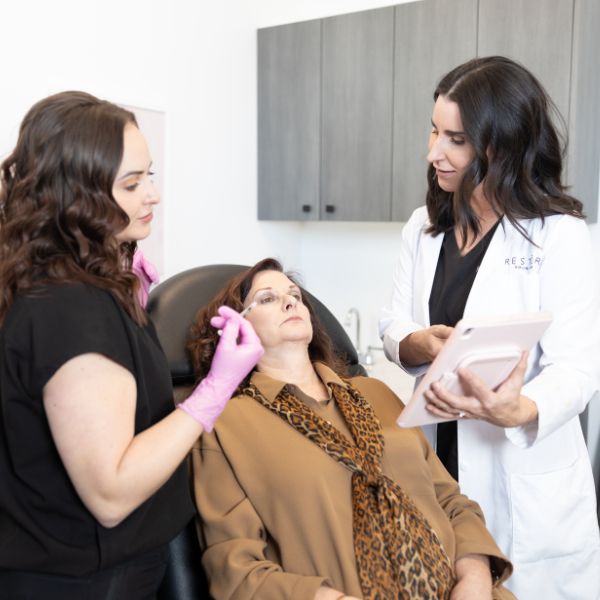
The Thrive Program
Hormone Replacement Therapy (HRT) and Nutrition Optimization
The Thrive Program consists of Hormone Replacement and Nutritional Optimization for both men and women - managed by our experienced medical providers. Hormone Replacement can be life changing for people struggling with the Menopause/Andropause transition – or for anyone seeking increased energy, improved mood, enhanced physical and mental performance, improved libido and overall vitality.
About The Thrive Program

FDA Approved
Hormone Replacement Therapy (HRT) has been FDA approved since 1942 – with millions of people treated worldwide.

Professional Support
Our experienced medical professionals are with you every step of the way - monitoring your labs and dosing - with 24/7 support throughout the program.

Convenience
Medications are shipped directly to your home, with check-in appointments available in person and virtually.

Nutritional Support
As a part of your Thrive Program, we will assess your nutritional needs and build a comprehensive plan to optimize your supplements and vitamins

Enjoy Increased Vitality
Hormone Replacement Therapy (HRT) can improve energy, sleep, strength and endurance, well-being and libido.

Improved Health
Hormone Replacement Therapy will help you lose fat and gain muscle. This leads to significant long term health benefits - including reductions in heart disease, diabetes, osteoporosis and dementia.
What is Hormone Optimization?
From the day we are born, our hormones act as our body’s natural “instruction manual” – and optimal hormone levels allow us to feel and function our best. Hormones are the messengers of our Endocrine system – but aging and disease can cause them to decline. When this happens, we begin an accelerated aging process. As we lose that “instruction manual” we experience fatigue, weight gain, decrease in mental sharpness, and decreased sexual desire and enjoyment.
The quality of our sleep declines and our strength and endurance are not what they were. We may feel anxious, depressed, or irritable and “grouchy” all the time. When we are injured or sick it takes us longer to heal - and we begin to lose the ability to do the activities that we used to enjoy. Then - in our mid 40s or 50s - Estrogen and Progesterone - the two main female sex hormones drop off very suddenly - leading to the additional symptoms of perimenopause and menopause such as hot flashes, painful intercourse, irregular bleeding, and declining short term memory (or “brain fog”).
Hormone replacement therapy allows you to feel and function your best by recreating the hormone levels your body produced when you were younger - which has been shown to not only prolong life but prolong the quality of one's life. Hormonal support is beneficial at any age, but the best long term protective benefits are achieved if hormones are replaced when you begin to lose them, usually in our 40's.
What Hormones do for Women?
Estradiol and Progesterone are the two hormones that most people are referring to when they discuss “taking hormones” or hormone replacement therapy (also called HRT or ERT).
Is HRT safe?
Under US law – hormones that are made naturally by our bodies cannot be patented. Because of this – in the early days of HRT several synthetic estrogens and progestins were developed and patented by pharmaceutical companies. Synthetic estrogen (ie: Premarin) and progestins (ie: Provera) are chemically altered so that they are not identical to human hormones. They are designed to try to elicit the same responses in your body as your natural hormones). This was done under the assumption that “estrogen is estrogen” – and that altering these molecules would not change their efficacy or safety in the human body.
Sadly – the most commonly used estrogens (CEE or Premarin – which is purified from the urine or pregnant horses) bind to the human estrogen receptor much more strongly than human Estradiol does – which resulted in the increase in heart attacks, strokes, and blood clots seen in studies like the Women’s Health Initiative. A similar result was found with synthetic progestins like Provera and MPA – which caused a slight increase in breast cancer rates in the women who took them. These frightening results caused a generation of women to stop taking HRT – leading to the early deaths of approximately 600,000 women from cardiovascular disease, dementia and osteoporosis which could have been prevented if those women had continued HRT (these findings were published in the Journal of
To make matters even more confusing – the words “estrogen” and “progesterone” are used both in medical literature and in the lay press to describe any molecule in the estrogen and progesterone families – each of which includes hundreds of unique molecules. So when you search for “is estrogen dangerous” you will find results for ALL estrogens – of which some are harmful and some are not. How is a person supposed to make sense of this?
BHRT (Bioidentical Hormone Replacement Therapy) uses only bioidentical progesterone and estradiol – which are exact copies of the molecules that your body makes naturally. To date there have been no scientific studies using these exact molecules that show any increased risk of heart attack, stroke, or cancer – meaning that taking these SPECIFIC molecules is, in fact, safe.
FAQs
Read the Scientific Literature supporting Hormone Replacement Therapy
We are building a library of the best and most up to date medical literature on HRT, TRT, and Hormone Optimization to help our patients make the best choices for their health. Please check back soon for updates!
What To Expect
Thrive Program Medical Evaluation
At your Thrive Program Medical Evaluation, one of our experienced providers will review your medical history, labs, and goals for your health. We will use a sophisticated scoring system to determine which hormones and nutrients you may be deficient in. We will pair this information with you laboratory studies to build a comprehensive care plan designed to acheive your goals.
Bloodwork
Before we build your personalized care plan, we will do extensive screening bloodwork to assess your currently health status, risk factors, and any existing nutritional deficits.
We will assess your labs frequently during our program - to ensure that your overall health status is being fully optimized.
*If you do not have labs, you can come in for a consultation, however you will not be able to begin the Thrive Program until your labs have been reviewed. Eligibility is not guaranteed.
Pre Screening Questions
Interested?

After you complete the pre-screening questions to see if you are eligible above, you can set up your initial Thrive Program consultation to learn more about what this exciting and groundbreaking form of medicine can do for you!
*If you do not have completed labs, we can do the initial Thrive Program consultation but cannot start the program until the necessary lab are complete.
Not A Member?
If you want to hear about our Medical Weight Loss and Aesthetic treatments in addition to our Thrive Program (Hormone Replacement Therapy and nutritional optimization) - please book a consultation below.!
